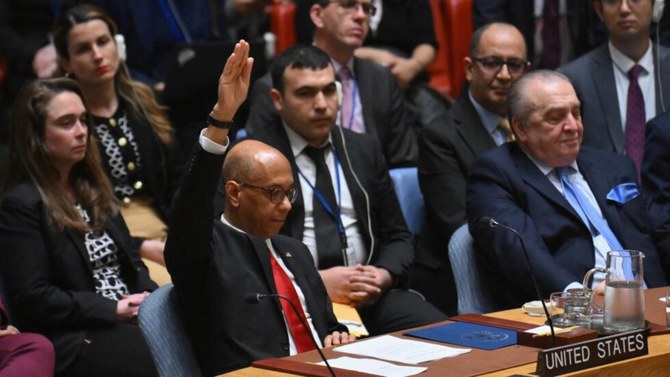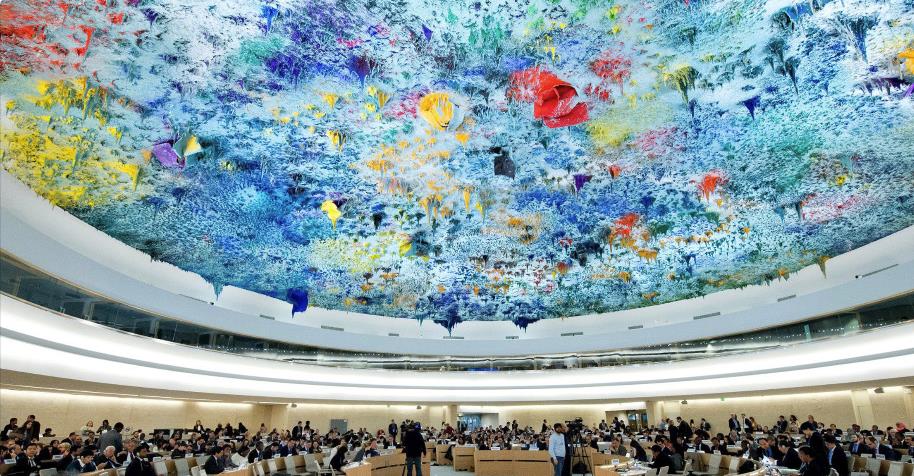
Geir Pedersen also told the Security Council that the humanitarian tragedy in the country is “only deepening,” with 14 million people now in need of aid to survive a harsh winter
America’s ambassador said her country is frustrated with the stalled efforts of the Syrian Constitutional Committee and the ‘unwillingness’ of the Assad regime to make progress
NEW YORK: The strategic stalemate in Syria makes it clear that no warring faction has the ability to decisively affect the outcome of the decade-long conflict, and so the idea that there can be a military solution is “an illusion,” the UN’s special envoy to Syria told the Security Council on Thursday.
“Despite the continued violence and suffering, (there have) been no shifts in the front lines for nearly two years,” Geir Pedersen said.
“It is clear that no existing actor or group of actors can determine the trajectory or outcome of this conflict, and indeed that the military solution remains an illusion.”
The envoy highlighted the precarious security situation that exists in several parts in the country, where “Syrians continue to suffer deeply.”
He said the violence continues unabated, including airstrikes on Idlib that kill civilians and damage infrastructure, mutual shelling across the front lines, hostilities in the northeast, improvised explosive device attacks in the north, and the Israeli shelling of the main commercial port of Latakiah. There have also been security incidents involving drug smuggling and Daesh attacks in the northeastern and central Syria, he added.
On a humanitarian level, Pedersen said the tragedy of the Syrian people is “only deepening,” exacerbated by the freezing winter conditions.
“14 million civilians now need humanitarian assistance,” he said. “More than 12 million remain displaced. Tens of thousands are detained, abducted or missing. The economy of Syria has collapsed. Criminality and smuggling are flourishing. And there are reports of young people seeking any opportunity to leave the country, sometimes falling prey to traffickers and warlords.
“Education is fragmented and severely degraded, as indeed are institutions and infrastructure across the board. The country remains de facto divided and society is deeply fractured. Syrians see no concrete progress toward a political solution.”
Having established this backdrop, the Norwegian envoy briefed the 15 members of the Security Council on his most recent efforts to advance the diplomatic process. He updated them on his meetings in recent weeks with officials from Germany, Iran, Russia, Turkey, Qatar and the UK to discuss the status of Syria’s Constitutional Committee, the most recent meeting of which took place in October last year.
In December, Perdersen’s deputy, Khawla Mattar from Bahrain, attended an Astana-format meeting in Kazakhstan where she met senior officials from Russia, Turkey, Iran, and the Syrian government and opposition.
She also met with representatives of the Working Group on the Release of Detainees and Abductees and the Handover of Bodies and the Identification of Missing Persons. Pedersen said good proposals emerged from that meeting “but what is absolutely needed is for these ideas now to be followed up on, as we are urging all stakeholders to do.”
Pedersen said he has also held a series of bilateral meetings with officials from Russia, the EU, Turkey, Qatar, the Arab League, Germany, France, Italy, the UK and the US. He described these consultations as a “rolling process where it will be necessary to revert to interlocutors repeatedly over time.”
He added: “My question to all interlocutors is the same: Can you identify not only what you demand, but also what you are prepared to put on the table in exchange for steps from the other side?”
The envoy said he seeks “fresh ideas from any quarter that could bring about action” on issues such as detainees and missing persons; the safe and “voluntary” return of refugees; restoring an economy that has “collapsed after more than a decade of war, corruption, mismanagement;” establishing calm throughout Syria; cooperation in fighting terrorism; and thoughts on the financial crisis in neighboring Lebanon.
Pedersen also highlighted the plight of civilians at Al-Ghuwayran prison in Al-Hasakah, northeastern Syria, which was the scene of an attempted jailbreak by hundreds of Daesh insurgents last week that left at least 300 detainees dead.
According to the UN’s Office for the Coordination of Humanitarian Affairs, more than 45,000 civilians have been displaced by the clashes that followed and retaliatory airstrikes from the US-led global coalition in support of the Syrian Democratic Forces on the ground.
Fionnula Ni Aolain, a UN human rights expert, expressed serious concern for the well-being of more than 700 children locked up the prison.
She said boys as young as 12 are living “in fear for their lives amid the chaos and carnage in the jail (and) are tragically being neglected by their own countries through no fault of their own except they were born to individuals allegedly linked or associated with designated terrorist groups.”
Pedersen said: “UNICEF drew attention to reports of (Daesh) members being holed up in dormitories for minors, putting hundreds of children in detention at risk.
“This episode brings back terrible memories of the prison breaks that fueled the original rise of (Daesh) in 2014 and 2015.
“I see this as a clear message to us all of the importance of uniting to combat the threat of internationally-proscribed terrorist groups — and to resolve the broader conflict in which terrorism inevitably thrives.”
Linda Thomas-Greenfield, the permanent representative of the US to the UN, said that the ongoing situation in Al-Hasakah “a stark reminder” that Daesh “remains a real threat.”
She also reiterated her country’s support for the diplomatic process in Syria and lamented the “less than constructive comments” by some states about Pedersen’s effort to advance the dialogue.
She singled out Syrian Foreign Minister Faisal Mekdad, quoting his public statement that Pedersen’s “steps-for-steps model as a way to resolve the crisis in Syria is unacceptable for us.”
Thomas-Greenfield said her country shares Pedersen’s frustration with the lack of progress by the Syrian Constitutional Committee, and expressed disappointment “with the Assad regime participants’ unwillingness to make progress toward this end.”
Ambassador Mohammed Abushabab, the UAE’s deputy permanent representative to the UN, expressed support for Pedersen’s efforts and told the council that his country’s vision of a peaceful solution in Syria involves “opening channels of communication and building bridges, creating opportunities to support and reinvigorate the Constitutional Committee and ending foreign interference.”
He added: “Creating an appropriate environment to achieve peace and stability in Syria requires an end to foreign interference in Syrian affairs. We stress here the importance of preserving the unity, independence and territorial integrity of the Syrian Arab Republic.
“In this context, the UAE supports the call of the United Nations secretary-general and the special envoy for Syria to reach an immediate ceasefire throughout the country, and we stress the importance of maintaining and sustaining it.”












